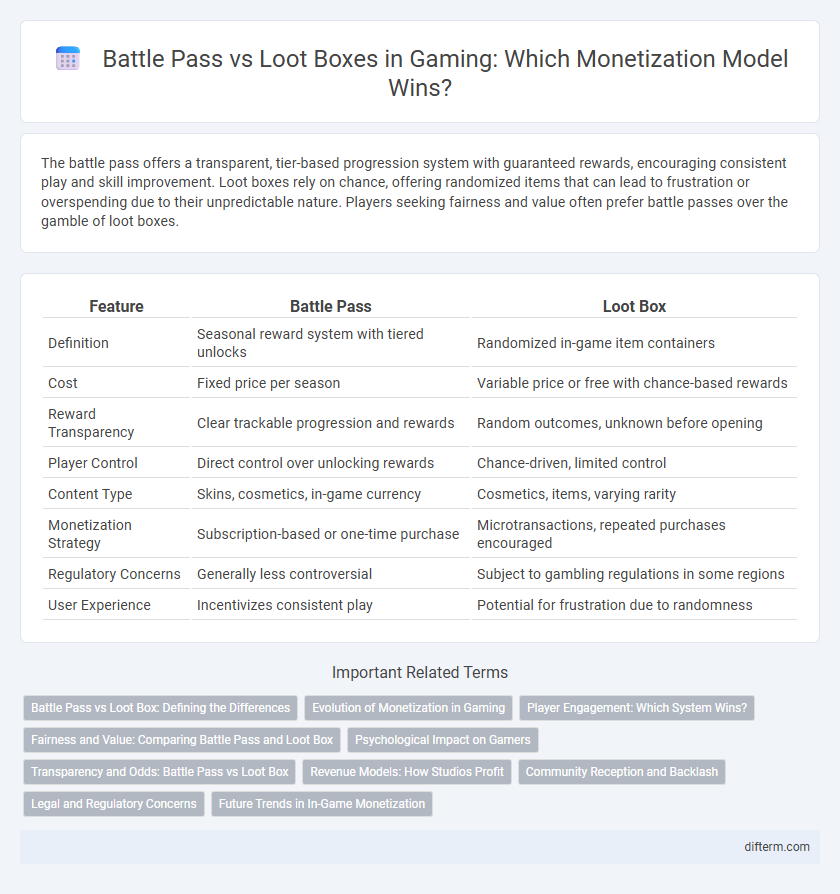The battle pass offers a transparent, tier-based progression system with guaranteed rewards, encouraging consistent play and skill improvement. Loot boxes rely on chance, offering randomized items that can lead to frustration or overspending due to their unpredictable nature. Players seeking fairness and value often prefer battle passes over the gamble of loot boxes.
Table of Comparison
| Feature | Battle Pass | Loot Box |
|---|---|---|
| Definition | Seasonal reward system with tiered unlocks | Randomized in-game item containers |
| Cost | Fixed price per season | Variable price or free with chance-based rewards |
| Reward Transparency | Clear trackable progression and rewards | Random outcomes, unknown before opening |
| Player Control | Direct control over unlocking rewards | Chance-driven, limited control |
| Content Type | Skins, cosmetics, in-game currency | Cosmetics, items, varying rarity |
| Monetization Strategy | Subscription-based or one-time purchase | Microtransactions, repeated purchases encouraged |
| Regulatory Concerns | Generally less controversial | Subject to gambling regulations in some regions |
| User Experience | Incentivizes consistent play | Potential for frustration due to randomness |
Battle Pass vs Loot Box: Defining the Differences
Battle Pass systems offer players a structured progression model with guaranteed rewards unlocked through gameplay, contrasting with Loot Boxes that provide randomized items often requiring microtransactions. Battle Passes emphasize skill and time investment to access exclusive content, whereas Loot Boxes rely heavily on chance and can lead to unpredictable player spending. This distinction highlights a shift towards more transparent and player-friendly monetization in gaming.
Evolution of Monetization in Gaming
Battle pass systems have transformed gaming monetization by offering players structured, tier-based rewards that encourage long-term engagement, contrasting with the random chance mechanics of loot boxes that dominated early microtransaction models. This evolution addresses both player satisfaction and regulatory concerns by providing transparent progression and guaranteed content instead of gambling-like elements. As a result, battle passes generate steady revenue while enhancing user experience and reducing controversies associated with loot box practices.
Player Engagement: Which System Wins?
Battle pass systems drive higher player engagement by offering clear progression paths, exclusive rewards, and predictable milestones that motivate consistent play. Loot boxes rely on randomness and chance, which can lead to frustration and decreased retention due to uncertainty and potential pay-to-win perceptions. Data from multiple game studies shows battle passes increase session frequency and long-term player investment more effectively than loot box mechanics.
Fairness and Value: Comparing Battle Pass and Loot Box
Battle passes offer a transparent progression system with guaranteed rewards tied to player activity, ensuring fairness by providing clear value for time invested. Loot boxes rely on chance-based mechanics, often leading to perceived unfairness due to unpredictable outcomes and potential for overspending. Players generally find battle passes deliver better value as rewards are earned through consistent play rather than random luck.
Psychological Impact on Gamers
Battle passes provide structured progression and clear rewards, fostering motivation and sustained engagement by tapping into goal-oriented behaviors. Loot boxes exploit variable-ratio reinforcement schedules, triggering dopamine releases similar to gambling, which can lead to addictive tendencies and increased impulsive spending. The transparency and predictability of battle passes generally support healthier gaming habits compared to the uncertain and potentially exploitative nature of loot box mechanics.
Transparency and Odds: Battle Pass vs Loot Box
Battle passes provide transparent progression with clearly defined rewards unlocked through gameplay milestones, enhancing player trust and satisfaction. Loot boxes often conceal odds of winning specific items or skins, leading to criticism for lack of transparency and potential gambling concerns. Clear disclosure of drop rates in battle passes contrasts with the often opaque mechanics of loot boxes, influencing player preference towards more predictable and fair reward systems.
Revenue Models: How Studios Profit
Battle pass systems generate steady revenue by offering tiered rewards that encourage prolonged player engagement and repeat purchases, creating predictable income streams for studios. Loot boxes rely on randomized item distribution, driving impulse buys through gambling-like mechanics that can yield high but volatile profits. Studios favor battle passes for their transparency and sustained monetization, while loot boxes provide spikes in revenue but face regulatory scrutiny and player backlash.
Community Reception and Backlash
Community reception of battle passes tends to be more positive than loot boxes, as players appreciate the transparent progression and guaranteed rewards without pay-to-win concerns. Loot boxes have faced significant backlash due to their randomized nature, often criticized for encouraging gambling-like behavior and exploiting player spending. Game developers increasingly favor battle passes to maintain player trust and avoid regulatory scrutiny associated with loot box controversies.
Legal and Regulatory Concerns
Battle passes offer transparent, fixed rewards structures that align with consumer protection laws, reducing risks of gambling classification faced by loot boxes. Loot boxes often trigger legal scrutiny due to their randomized nature resembling gambling, leading to bans or restrictions in jurisdictions like Belgium and the Netherlands. Regulatory bodies increasingly favor battle passes as compliant monetization methods, emphasizing fairness and transparency in gaming economies.
Future Trends in In-Game Monetization
Battle passes are increasingly favored over loot boxes due to their transparent reward structure and guaranteed progression, aligning with player demands for fairness and predictability. Emerging trends indicate a shift towards personalized battle pass content leveraging AI to enhance player engagement and retention. Regulatory scrutiny on loot boxes drives developers to innovate ethically monetized models, with blockchain-based digital ownership poised to redefine in-game economies.
battle pass vs loot box Infographic

 difterm.com
difterm.com